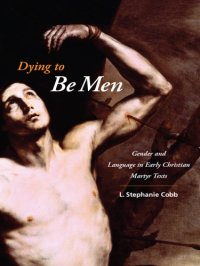
Ebook: Dying to be men: gender and language in early Christian martyr texts
Author: Cobb L. Stephanie
- Tags: 11.51 early Christianity, Church history--Primitive and early church, Frau und Mann--Märtyrer--Geschichte Altertum, Martelaarsakten, Martyrdom, Martyrdom--Christianity, Märtyrer--Frau und Mann--Geschichte Altertum, Martyrologies, Martyrologies--History and criticism, Sekseverschillen, Sex role--Religious aspects--Christianity--History of doctrines--Early church ca. 30-600, Church history--Primitive and early church ca. 30-600, Criticism interpretation etc, Martyrologies -- History and criticism, Martyrdo
- Series: Gender theory and religion
- Year: 2008
- Publisher: Columbia University Press
- City: New York
- Language: English
- epub
At once brave and athletic, virtuous and modest, female martyrs in the second and third centuries were depicted as self-possessed gladiators who at the same time exhibited the quintessentially "womanly" qualities of modesty, fertility, and beauty. L. Stephanie Cobb explores the double embodiment of "male" and "female" gender ideals in these figures, connecting them to Greco-Roman virtues and the construction of Christian group identities.
Both male and female martyrs conducted their battles in the amphitheater, a masculine environment that enabled the divine combatants to showcase their strength, virility, and volition. These Christian martyr accounts also illustrated masculinity through the language of justice, resistance to persuasion, and-more subtly but most effectively-the juxtaposition of "unmanly" individuals (usually slaves, the old, or the young) with those at the height of male maturity and accomplishment (such as the governor or the proconsul).
Imbuing female...